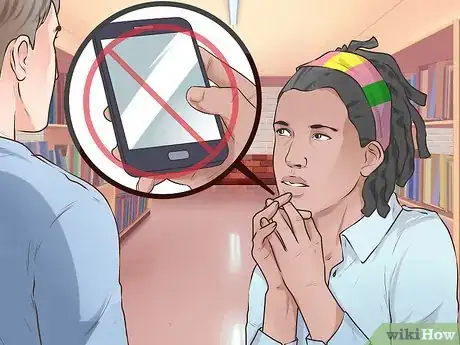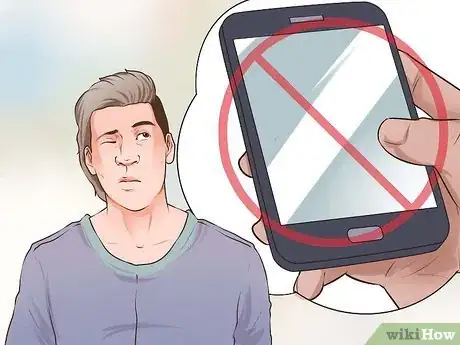This article was co-authored by Sarah Schewitz, PsyD. Sarah Schewitz, Psy.D. is a licensed clinical psychologist by the California Board of Psychology with over 10 years of experience. She received her Psy.D. from the Florida Institute of Technology in 2011. She is the founder of Couples Learn, an online psychology practice helping couples and individuals improve and change their patterns in love and relationships.
There are 12 references cited in this article, which can be found at the bottom of the page.
This article has been viewed 362,741 times.
Relationships can be tough, and breakups even tougher. After a breakup there may be a number of reasons why you’d consider talking to your ex. You may want to continue a friendship with them even if the relationship didn’t work out. You may want to ask for more distance, if you’ve kept up with each other. You may have children together, which means you have to talk at least about their welfare. You may even want to try and get back together. But before you start dialling or typing, take a moment to think through your reasons. Whatever they are, there are a number of steps that can help you through the process of talking to your ex.
Steps
Contemplating Your Reasons
-
1Ask yourself why you want to talk to your ex. There may be a number of reasons why you feel you want or need to talk your ex. And there are multiple perspectives to consider. Are you trying to talk to your ex because up until now you haven’t remained in touch? Or have you tried to remain friends, and now you want to talk to them about getting more distance? Do you have to talk to your ex because children are involved? Think about your reasons for a little while to ensure it is truly what you want to do.[1]
-
2Avoid contacting your ex just to complain. While the relationship may have ended, there must have been something good about it at some point. Continuing to bring up wounds and complaints will not help solve problems, and it does not help the relationship between you if you’re trying to remain friends.[2]
- If you have children with your ex, consider the effect of complaining on them, as well. You don’t want to make your children feel like their parent is a terrible person by constantly complaining.
Advertisement -
3
-
4Do not send the wrong message. Are you possibly looking for a casual relationship only involving sex? While your ex could potentially be a good candidate, there is also a possibility that they still harbor romantic feelings for you. Attempting to start a new type of relationship with your ex, without setting up very clear expectations, may only lead to additional heartbreak.[5]
-
5Avoid using your ex as an emotional crutch. It’s easy to rely on the familiar when you’re having a moment of loneliness or despair. You may think your ex might be the best way to make you feel better. However, you must be careful to avoid relying on your ex as an emotional crutch. Reach out to other friends and sources of support too.[6]
-
6Remember why you broke up. Regardless of what your decision ends up being (to talk to, or not to talk to, your ex) remember there was a reason you broke up in the first place. If you’re thinking there might be a way to make things work, be realistic. One more date isn’t suddenly going to make your ex a new person. And promises from either side to change are most likely empty.[7]
Reaching Out
-
1Put out feelers. It might have been a long time since you last spoke to your ex. A lot of things may have changed for them, and you. Consider starting small, possibly via social media. Write your ex a direct message or email and mention the positive things that have happened to you since you last spoke. Try not to over do it; keep it small, simple and friendly. Give your ex the opportunity to be friendly back.[8]
-
2Suggest something to do. If your ex answered back and seems interested in talking further, suggest meeting up somewhere you both enjoyed and has positive memories. Provide more than one idea and ask them what they’d prefer.[9] If your ex is unavailable to meet in person, or maybe doesn’t live nearby, arrange to chat on the phone. Ask them what days and times they are available and give them a call. Planning it in advance avoids the possibility of not connecting due to busy schedules.[10]
- For example, was there a specific coffee shop or restaurant you hung out at a lot with your ex that only has positive memories? Or maybe a park or bakery that has no history with you and your ex? Pick a location like this for a first meeting so that nothing about the location hinders your relationship moving forward.
- If you and your ex tend to have a conflictual relationship but need to meet and talk, for example about your children, a public place can help encourage both of you to stay in control of your emotions.
- Skype is an excellent way to stay in touch via long distances (or even short distances for that matter) that is inexpensive and easy. As long as both parties have a computer or tablet plus an internet connection, you’ll be able to use Skype. The nice thing about Skype is that you do not have to use the camera if you don’t want to.
-
3Do something kind and thoughtful. If you want to continue being friends with your ex, a thoughtful gesture can encourage them to think positively of you. Exactly what kind and thoughtful thing you do will be up to you, but it should be based on your personality and what you feel comfortable doing. Don’t go overboard and make your ex uncomfortable, but think of something that they would appreciate and enjoy. One option is to show that you remember something specific thing about them (e.g., a love for a certain chocolate bar only available in one store, a passion for a specific type of tea, etc.) which can show your ex you haven’t forgotten the good times.[11]
- For example, maybe your ex really liked a specific craft beer only found in a few locations, or maybe they collect something like figurines or snow globes. Something inexpensive, simple, yet thoughtful like this would be a nice gesture to show you still remember many great things about your ex.
-
4Be clear about your intentions.[12] You’ve initiated this contact for a reason. You’ve decided you want to form some type of relationship with your ex. Make sure you understand exactly what it is you want, and make that clear to your ex. If you’re only looking to be friends, make sure that is understood. If you’re looking to get back together, say so. If you do not want to contact your ex except when you have to discuss matters such as your children, let your ex know that too. Chances are your ex is wondering what you want, and may catch you off guard by asking. Be prepared with an answer.[13]
- The best way to be clear about your own intentions is to have a goal. Determine exactly what it is that you want from your ex, and stick to that. If you want to get back together, be clear about that right up front. If you simply want to be friends, make sure your ex understands that right away. And if your ex asks you to settle for less than what you want, seriously consider walking away.
-
5Prepare yourself for a negative reaction. Remember that there was a reason you broke up. Your ex may have experienced emotions from your break up that you never knew about or understood. You have to prepare yourself that your ex may react negatively to whatever you’re suggesting, even if you have nothing but good intentions. Don’t turn the rejection into a scene, and don’t do or say something you might regret later. [14]
- Before you meet or talk to your ex, think about all the possible ways they may react -- both good and bad. Think about the reasons why your ex might have each of those reactions. Prepare your response to these possible reactions (in general) so you’re not taken by surprise when and if they actually happen.
Having the Discussion
-
1Consider your personal communication style. Everyone has a slight different style in the way they communicate. Those styles may affect how your ex will understand what you’re saying. If you have a better understanding of your personal way of communicating, you can gain a better understanding of how you may be interpreted. This could help avoid confusion and conflict, but it might also help you alter your style if you know your ex won’t react well to your typical style.[15] For example, if you are normally someone who comes across as very direct, but you know your ex scares easily, you may want to tone down how direct you are, at least at first.
- Affiliative communicators tend to like collaboration. When they need to make a decision, they obtain multiple opinions from different people before coming to a conclusion. This means they are very likely to listen to what their partners suggest and take that opinion into consideration when making their decision.
- Competitive communicators like power and dominance. They tend to make decisions on their own without collaboration. They’re likely to be assertive (but not necessarily aggressive), direct and will sometimes challenge others who may disagree with them.
- Direct communicators are exactly that - direct. They say it like it is, and don’t beat around the bush. If they want something specific, they’ll tell you. If they don’t like something you’re doing, you’ll know. This directness allows this type of communicator to be understood pretty quickly. There is usually little confusion about what it is that they want. Sometimes direct communicators may come across as forceful or aggressive.
- Indirect communicators have trouble telling others what they think, want, or need. They may make implications about things that they hope someone will understand by reading between the lines. There tends to be a lot more confusion and misunderstandings with this type of communication, but it may also seem less aggressive.
-
2Remember to be an active listener. Listening is a vital part of any communication. Being aware of what your ex is telling you (what they are saying AND what they mean) is referred to as active listening. Active listening is even more important when you think about all the distractions you are likely to encounter when you’re having a conversation. Your cell phone, honking cars, TVs, arguing people, etc., all have a way of taking your attention away from your ex and directing that attention elsewhere. There are many specific things you can do to train yourself to be a better active listener.[16]
- Restate and summarize what you’ve just been told. Feel free to restate it using words that might make the meaning clearer and simpler. By restating and summarizing what you’ve heard, your ex not only knows you were paying attention, they will know whether you actually understood what they were trying to get across.
- For example, you could say: “I’m hearing you say that you want to take the children every other weekend, instead of every weekend. Is that right?”
- Don’t interrupt. If your ex is trying to get something across, pay attention by looking them in the eye, and nodding your head or saying small things to encourage your ex to continue. Let them get whatever they're trying to say out without forcing them to stop and lose the train of thought. This includes being silent when the other person is thinking or when they are trying to come up with the proper words to use.
- Ask questions. If you don’t understand something, or you need clarification, ask. If you feel your ex has only touched on the surface of a specific thought or feeling, ask questions to get them to go into more detail.
- Try to keep these questions open-ended, rather than accusative. For example: “How do you see us interacting in the future?”
- Validate your ex's emotions. Be empathetic to what they’re saying. If it sounds like a situation they’re talking about was really frustrating, tell them it sounds like they’re really frustrated. Say things that make them feel good about opening up to you. If they’ve just told you something that was obviously very difficult for them to get out, thank them for sharing it with you.
- Restate and summarize what you’ve just been told. Feel free to restate it using words that might make the meaning clearer and simpler. By restating and summarizing what you’ve heard, your ex not only knows you were paying attention, they will know whether you actually understood what they were trying to get across.
-
3Leave the avenues of communication open. Be careful that the combination of your communication style and active listening techniques doesn’t undermine what your ex is trying to tell you. This is especially important if one of the reasons you broke up with your ex was due to the lack of, or bad, communication. If the communication styles being used previously didn’t work, you need to try something new this time around or you won’t be able to move forward. There are several things that are helpful to remember not to do when having a conversation with your ex.[17]
- Don’t ask too many questions that start with why - especially if the question starts like “why didn’t you …” Asking these types of questions tend to simply make people defensive, and you could end up starting an argument.
- Don’t diminish your ex’s feelings by saying they shouldn’t worry about something, or that they shouldn’t let something bother them. You’re not the judge of what can or cannot bother or worry another person. They have a right to worry or be bothered about something.
- If you start asking clarifying questions or questions to help your ex explain something in more detail, but they seem really hesitant to do so, stop. Don’t push them into saying something they don’t want to. If they want to tell you something, they’ll tell you when they're ready.
- Don’t assume you know how your ex feels. This includes telling them a story about your life for every story they tell you about theirs. If they tell you about a time when they were really upset because something happened, don’t turn it into a story about you and a time you were once really upset.
-
4Speak in the language of ‘I’. If you’re trying to explain how you feel (or felt) to you ex, don’t turn it into a blame session where you’re just listing all the things they did that upset you - “You always ignored me,” “You never wanted to spend time with me,” or “You always wanted to spend time with your other friends.” Instead make sure you use ‘I’ in every sentence - “I felt like I was being ignored,” “I was upset when I didn’t get to spend much time with you,” or “I sometimes felt like I was being left out.”[18] The same examples also try not to exaggerate what really happened by using words like “always” or “never.”
-
5Do not turn the conversation into an argument. You don’t have to always be right. And your ex doesn’t always have to agree with you, or you with them. The point of this conversation isn’t to have an argument or a debate where someone has to win. It’s to have an intelligent and positive conversation about an important topic you need to speak to your ex about. There are no winners or losers.[19]
- This doesn’t mean you aren’t allowed to have emotions about how your ex feels or what your ex thinks. You can still feel annoyed or frustrated with something they do or say. Try not to act out with those emotions without some thought first. Take a moment to contemplate why your ex did or said something and ask yourself if maybe it was justified.
-
6Examine the origins of your feelings. You and your ex are human. You both will have emotions at times that are uncomfortable, but it doesn’t mean you aren’t allowed to have them. It isn’t wrong to have a thought or emotion, but it is important to try to recognize when you may be projecting your emotions onto others and admit it. You might even have a perfectly reasonable explanation as to why you sometimes have such thoughts or feelings, possibly due to your past experiences.[20]
- For example, if you’ve dated people who have cheated on you in the past, and one way they lied to you was to say they were working late at the office, you might think irrationally if your partner tells you they have to work late at the office. Take the time to explain this to your partner. Explain where that thinking comes from, and that you realize they’ve done nothing to lose their trust, but you still have these thoughts anyway because of your past experiences.
- Sometimes, feelings and thoughts may be irrational. For example, you may be jealous that your ex has a new partner, even though you don’t want to get back into a relationship with them yourself. Your feelings may just be because your ex means a lot to you. It’s okay to have these feelings and thoughts too.
-
7Be open, honest and respectful. Since you’re having this conversation because you have a specific goal you need to accomplish with your ex, you need to be as clear, concise and honest as possible, as soon as possible. Explain what it is that you want - from your ex and your relationship. Explain what you’re hoping will come from this conversation. Explain why you feel this way. Accept that you have needs and wishes, and that that is perfectly okay.
- Remain understanding and honest even if your ex doesn’t treat you with respect. If they end up treating you badly, or saying something hurtful, remember you prepared for this. You can rise above this and you will be okay. There’s no point in lowering yourself to their level and being disrespectful back. You might end up regretting it later.[21]
Getting Over Your Ex
-
1Remind yourself that you broke up for a reason. Breaking up with someone, especially someone you had very strong feelings about, can make you feel like the world is crumbling down around you. It’s important to remind yourself that there is usually a very good reason for relationships to end. There probably was an excellent reason why you and your ex broke up, even if you can’t remember it during your darkest moments. Try to avoid pursuing a relationship that would not but functional.[22]
-
2Allow yourself to feel. Realize it’s okay to feel the grief and sadness. Don’t force yourself to do things you don’t want to do. It’s okay to give into the compulsion to lie in bed all day and call in sick.[23] Don’t worry if you eat too much chocolate. One of the important things is to try to prevent yourself from giving into your urge to contact your ex in order to feel better. You can do it![24]
-
3Have faith in yourself. You are stronger than you think. You will make it through this, even if it doesn’t feel like it right now. You may find yourself reliving certain events and dwelling on the reasons why it didn’t work out. The problem is, you may never really know. There might not be a good reason. But you don’t have to understand why the breakup happened to get over it. You just need to get through the hour, day, week - one step at a time.[25]
-
4Ask for help. Don’t try to fight your way through your grief by yourself. Reach out to friends, family and professionals for help. Talk about how you’re feeling and allow yourself to grieve. It’s important for people to know you’re struggling, you might find yourself just relieved that you’re not the only one who knows how you feel. If talking is too difficult, try writing your thoughts and feelings in a journal, and just use your friends and family for companionship.[26]
-
5Learn from what happened. After you’ve moved yourself through the days of being unable to think clearly and do anything productive, you can start thinking about how this whole experience will make you stronger. You’ll also start to realize that as bad as you feel, you do actually feel better than you did a short time ago. You’ve improved. You’ve been able to heal a little bit. More healing is inevitable.[27]
-
6Take care of yourself. Once you feel yourself on your road to recovery, get yourself back into a regular routine. Include relaxing activities where you can just enjoy yourself (e.g. go for a walk, read a book, have a bubble bath, etc.). Say “no” when you need to. Go out or stay in as you desire. Get enough sleep and eat properly.[28]
Expert Q&A
Did you know you can get expert answers for this article?
Unlock expert answers by supporting wikiHow
-
QuestionIs it okay to talk to my ex?
 Sarah Schewitz, PsyDSarah Schewitz, Psy.D. is a licensed clinical psychologist by the California Board of Psychology with over 10 years of experience. She received her Psy.D. from the Florida Institute of Technology in 2011. She is the founder of Couples Learn, an online psychology practice helping couples and individuals improve and change their patterns in love and relationships.
Sarah Schewitz, PsyDSarah Schewitz, Psy.D. is a licensed clinical psychologist by the California Board of Psychology with over 10 years of experience. She received her Psy.D. from the Florida Institute of Technology in 2011. She is the founder of Couples Learn, an online psychology practice helping couples and individuals improve and change their patterns in love and relationships.
Licensed Psychologist
References
- ↑ http://psychcentral.com/blog/archives/2013/11/17/tips-for-talking-about-tough-topics/
- ↑ http://www.womansday.com/relationships/dating-marriage/advice/a7060/what-to-say-to-your-ex/
- ↑ Sarah Schewitz, PsyD. Licensed Psychologist. Expert Interview. 15 April 2019.
- ↑ http://www.womansday.com/relationships/dating-marriage/advice/a7060/what-to-say-to-your-ex/
- ↑ http://www.womansday.com/relationships/dating-marriage/advice/a7060/what-to-say-to-your-ex/
- ↑ https://www.psychologytoday.com/articles/201012/the-thoroughly-modern-guide-breakups
- ↑ https://www.psychologytoday.com/blog/me-we/201306/how-mourn-breakup-move-past-grief-and-withdrawal
- ↑ http://www.womansday.com/relationships/family-friends/tips/g1014/how-to-rekindle-a-friendship/?slide=2
- ↑ http://www.womansday.com/relationships/family-friends/tips/g1014/how-to-rekindle-a-friendship/?slide=2
- ↑ http://www.womansday.com/relationships/family-friends/tips/g1014/how-to-rekindle-a-friendship/?slide=5
- ↑ http://www.womansday.com/relationships/family-friends/tips/g1014/how-to-rekindle-a-friendship/?slide=5
- ↑ Sarah Schewitz, PsyD. Licensed Psychologist. Expert Interview. 15 April 2019.
- ↑ http://psychcentral.com/blog/archives/2013/11/17/tips-for-talking-about-tough-topics/
- ↑ http://psychcentral.com/blog/archives/2013/11/17/tips-for-talking-about-tough-topics/
- ↑ https://www.psychologytoday.com/blog/high-octane-women/201104/are-we-talking-the-same-language-how-communication-styles-can-affect
- ↑ http://psychcentral.com/lib/become-a-better-listener-active-listening/
- ↑ http://psychcentral.com/lib/become-a-better-listener-active-listening/
- ↑ https://www.psychologytoday.com/blog/the-new-you/201312/how-do-i-improve-my-relationship-three-helpful-tips
- ↑ http://www.psychalive.org/communication-between-couples/
- ↑ http://www.psychalive.org/communication-between-couples/
- ↑ http://www.psychalive.org/communication-between-couples/
- ↑ https://www.psychologytoday.com/blog/me-we/201306/how-mourn-breakup-move-past-grief-and-withdrawal
- ↑ Sarah Schewitz, PsyD. Licensed Psychologist. Expert Interview. 15 April 2019.
- ↑ https://www.psychologytoday.com/blog/me-we/201306/how-mourn-breakup-move-past-grief-and-withdrawal
- ↑ https://www.psychologytoday.com/blog/me-we/201306/how-mourn-breakup-move-past-grief-and-withdrawal
- ↑ http://www.helpguide.org/articles/family-divorce/coping-with-a-breakup-or-divorce.htm
- ↑ https://www.psychologytoday.com/blog/me-we/201306/how-mourn-breakup-move-past-grief-and-withdrawal
- ↑ http://www.helpguide.org/articles/family-divorce/coping-with-a-breakup-or-divorce.htm
About This Article
Talking to your ex is rarely easy, but you can make the process smoother by staying positive, communicating clearly, and staying in control of your emotions. Regardless of why you broke up, try to be friendly to your ex and do your best to avoid bringing up the past. You should also make your intentions clear so you don’t end up confusing them. For example, if you want to get back together with your ex, tell them how you really feel rather than asking if you can still be friends. Once you’ve had your say, listen to them carefully without interrupting to validate your ex’s feelings. If what they tell you isn’t what you wanted to hear, avoid lashing out or being judgmental, which can lead to an argument. Instead, remind yourself why you broke up with them in the first place so you can focus on how much better your life is without them. For more advice from our co-author, including how to work through the grief of losing your ex, keep reading.




















































































